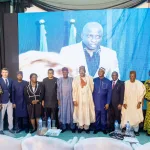The African Development Bank (AfDB) has uncovered startling revelations about Lagos State’s budget allocation and its impact on the city’s impoverished population.
The report titled From Millions to Billions: Financing the Development of African Cities’, highlighted that despite a significant portion of the budget directed towards capital projects, the poorest communities in Lagos often fail to benefit from essential infrastructure and services.
Join our WhatsApp ChannelThe report emphasized, “The relatively high capital component of Lagos State’s budget (58%) does not always translate into implementation of basic infrastructure and services for the city’s poorest people, but Lagos is deliberate in trying to attract multinational companies and foreign investment.”
READ ALSOAfDB Unveils Programmes To Bolster Macro-Economic Governance In Africa
Furthermore, the breakdown of the budget revealed that while a substantial percentage was designated for capital projects, the allocation did not necessarily target fundamental necessities for the most disadvantaged.
The report cited concerns over revenue sources, stating, “Own-source revenue in 2023/24 was estimated at $1.83 billion, with the 25-30% shortfall filled by borrowing (20%) and transfers from the federal government (10%). Non-compliance with tax obligations is a critical issue.”
Highlighting the contrast in resource distribution, the report pointed out that public-private partnerships (PPP) largely favored the affluent, resulting in limited access to basic services for a percentage of Lagosians. Despite infrastructure investments, the report claimed, “65% of Lagosians do not have access to electricity and 85% rely on informal sanitation.”
The AfDB’s critique extended to Lagos State’s debt situation, cautioning about its sustainability and potential repercussions. The report revealed that the state owed significant amounts domestically and internationally, raising concerns about the capacity to service this debt, especially with the currency depreciation.
The revelation by Prime Business Africa of extravagant expenses within the state budget by the ADC gubernatorial candidate Funso Doherty triggered a wave of public outrage.
Details of exorbitant spending, including the replacement of liquid fragrance at the Governor’s office and the purchase of expensive bulletproof SUVs, stirred controversy. Doherty’s open letter to Governor Babajide Sanwo-Olu regarding what he termed ‘wasteful expenditures’ ignited a firestorm on social media platforms.
Amidst this uproar, Gbadebo Rhodes-Vivour, the Labour Party candidate for governor of Lagos state, condemned the alleged squandering of resources, emphasizing the need for better alignment between government expenditure and the urgent needs of the people.
The revelations from the AfDB report and the subsequent public outcry have put pressure on Lagos State Government to address concerns of fiscal responsibility and equitable allocation of resources for the benefit of all citizens.
Emmanuel Ochayi is a journalist. He is a graduate of the University of Lagos, School of first choice and the nations pride. Emmanuel is keen on exploring writing angles in different areas, including Business, climate change, politics, Education, and others.


















Follow Us